In 2013, I retraced the journey of my maternal grandfather, Elmo Cermaria, ground solder and countryman from Sant 'Angelo in Lizzola (PU). Elmo, a 19-year-old youth, one of the 2,600,000 peasants who went to war to die a hundred years ago. He was abandoned by his commanders on the Fajtji Hrib, taken prisoner. He went through all the streets of hell; more than 5,500 km confined in three different camps: Sigmundsherberg, Josikafalva, Vinkovci. Treated worse than a beast, in spite of everything and everyone, relying only on himself, he survived and came home alone, alive. In this summary, I report only part of the story written by my grandfather, from his imprisonment until the end of the Great War. The facts took place exactly a century ago. The whole story of my grandfather, which lasted three years, between war and imprisonment and the considerations that came out of it, are reported in my book: Forte Verena – 24 Maggio 1915, ore 4. Trilogia della Grande Guerra, Edizioni il Fiorino, Modena.
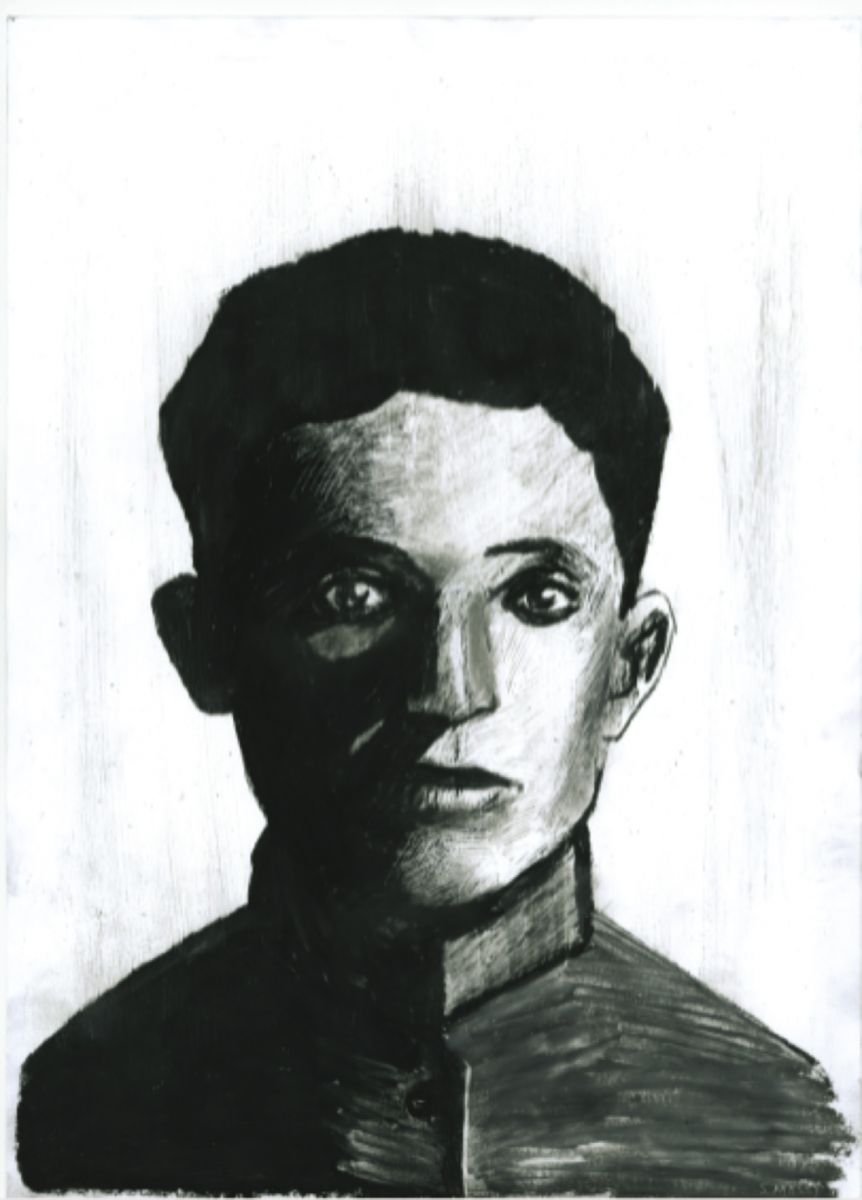
This part of the story begins on October 29, 1917, on the Fajtji hrib and ends on November 11, 1918, in Rijeka.
(...) We arrive on October 29, 1917.
We realized that we were all prisoners because we remained isolated. We all withdrew from the valley and only waited for the Germans to arrive, because where there was no one left on our line, everyone had fled; we did not know where to go. Our officers had abandoned us. We were on the Dosso Faiti (Author's note: today Fajtji hrib, in Slovenia) which is a very high mountain, we saw German rockets on Mount San Michele, which means 8 km or 10 km behind. It was clear that we were prisoners because we were trapped inside enemy lines. Our officers had left us there without any orders whether to advance or withdraw. Around the 23rd, five German soldiers arrived, fired a few shots from the valley and made us prisoners. We gave up our weapons. To tell it all it would be too dirty. Our commanders withdrew by day and I think that they were all saved, while we, poor soldiers, were there in the trenches guarding the front, and dying. This was what we thought because they had abandoned us without any command. We could not be cowards and leave the trench, but in the end we had to give up because we were surrounded. Among the officers who fled there was also the lieutenant who ordered soldiers to stay put when they were ill, and it appeared that they were not "too ill." Once we were taken prisoners, they lined us up. A German soldier took the lead and we began to march. While we were walking, the German soldiers gave us their hands and said: "gut noben Tagliano nietz broten." A friend of mine wanted to know what they said, I understood and said: "Nothing. They're asking us if we have bread, imagine. Things are going well." We had not touched our rations for three days because of the bombings and the flight, we had not received any food.
At one point they had us stay in a ruined house until the next day. The next morning the Germans gave us some warm water, without bread. We started walking again until the San Daniele station (Author's note: today Štanjel, in Slovenia), north of Trieste. Once we arrived they were asked to stay in a meadow with guards around us: it was raining heavily, we were wet from head to toe and we still had not eaten all day. In the evening the order to leave arrived: as we went to the station we saw country pots where the Germans were cooking dried beets, the same beets that we peasants feed the animals. Each of us was given a piece of bread and a small bowl of boiled beets.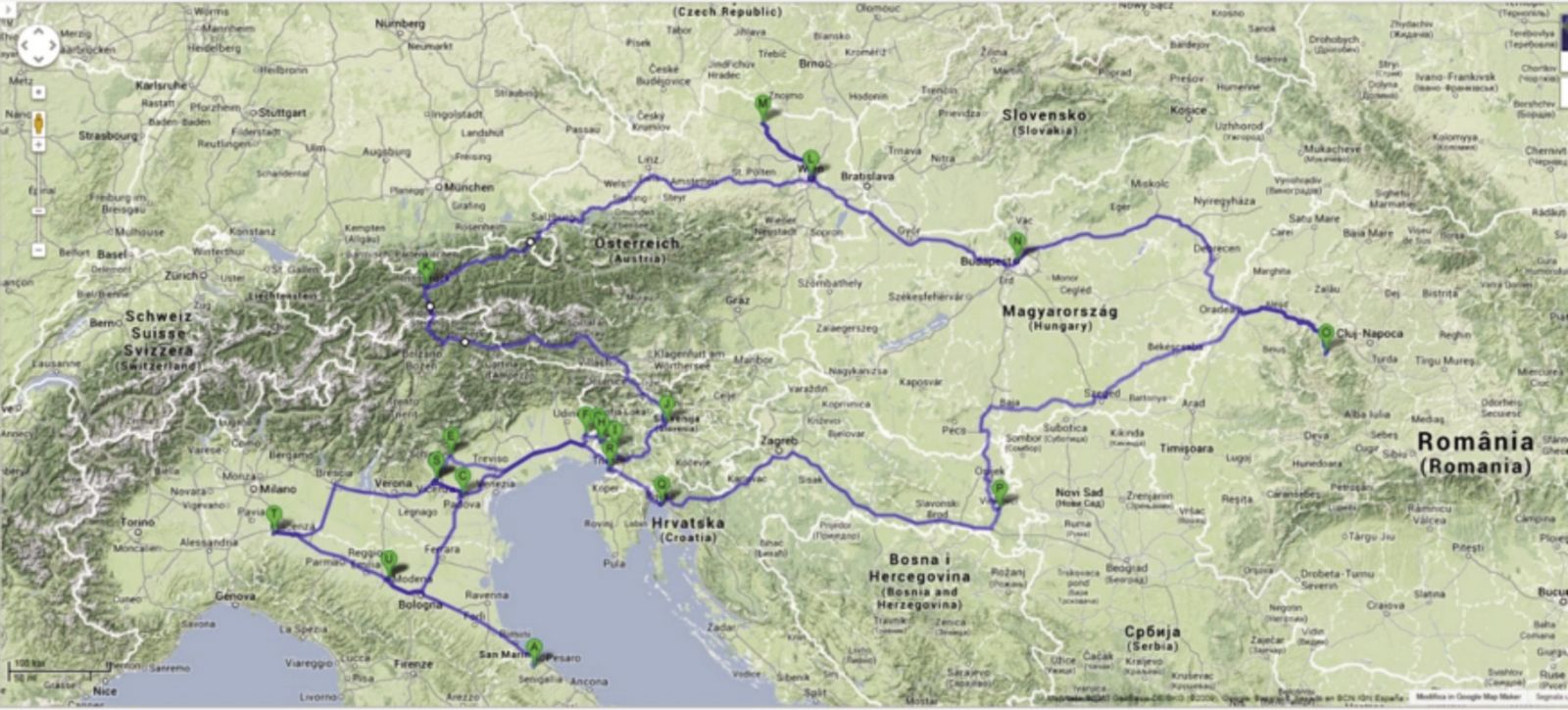
When my turn came, they gave me the beets... but there was no more bread. I waited because I had understood that they had gone to get more, but in that moment a German soldier arrived, shoved me off like a dog and without bread. We were so ravenous and the craving for that bread so strong that I began to cry, sobbing like a child.
While I was there with my head in my hands crying, another German soldier saw me and asked what the matter was (this one spoke Italian): I told him what happened. The soldier took me with him to the place where bread was distributed and asked that I be given the piece of bread I was meant to have. How good that bread was!
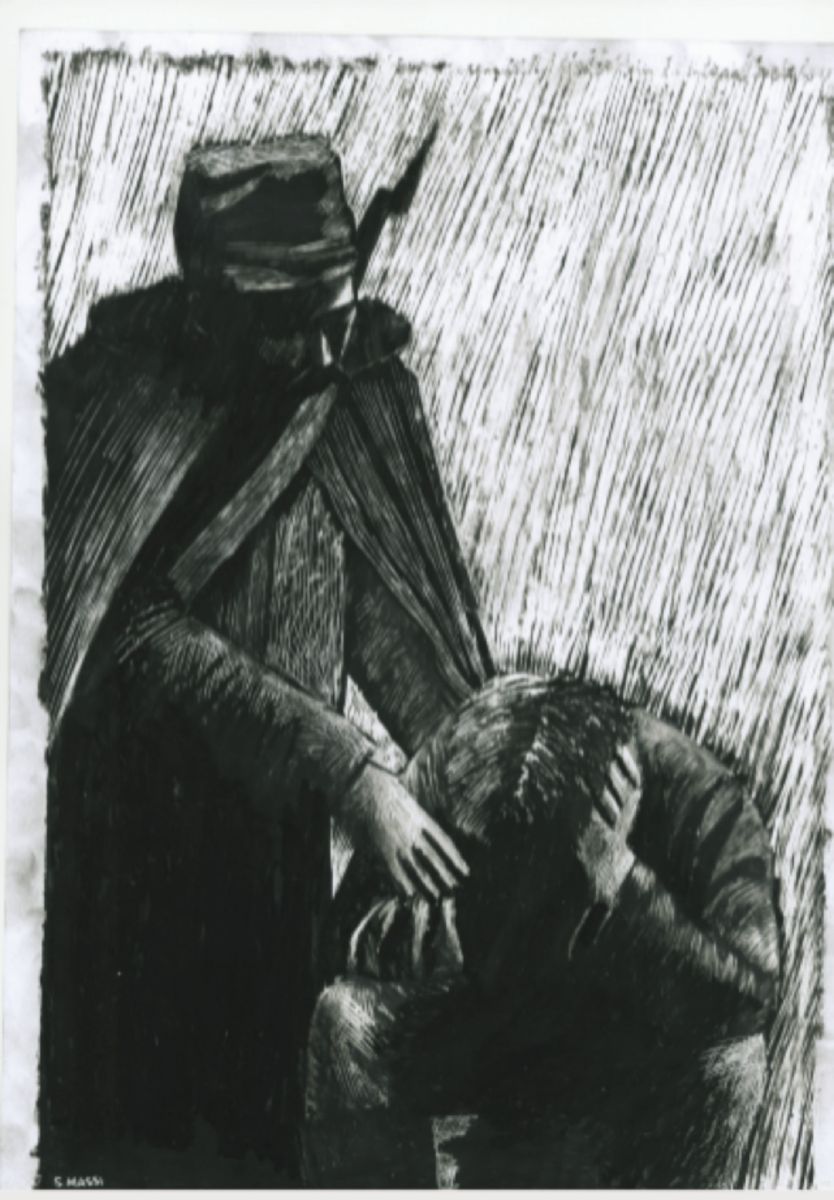
After eating our ration, we all went to the station and were loaded on open wagons. It kept raining and to keep ourselves warm we sat pressed to each other. The train left I cannot say for what destination. Perhaps we passed through Ljubljana. At one point the train stopped between two mountains on a dead track. On the top of those mountains, it was snowing while below in the valley it kept raining. We stayed there all day without eating. At about 2 o'clock, a train went by: there was a wagon full of red beets, and as it slowed down, we managed to get one for each, but we only ate half of it, keeping the remainder for later.
We were convinced that as soon as darkness would come, they would shoot us. The fear was such that it made us forget the cold, our tiredness, everything. Night came, and suddenly the train began moving, I thought: "We're safe for now." Later, the train stopped in a station, I don't remember if it was Innsbruck.
There they gave us a bit of polenta, some bread and a piece of salami like black pudding. Then I really thought: "We're not going to die today." We stayed eight days and nine nights in that train because it was going very slowly and had to keep the track free for the trains transporting German troops and material to the front (they were moving up to the Piave). We also went to Vienna and then two more days to the north of Vienna on the border with Czechoslovakia. We were going to the Sigmundsherberg concentration camp. From a distance this camp seemed to us like it was a big city (Author's note: It was called the city of wood or the city of the dying.). I learned then that before us (Author's note: Grandpa Peppe with the remaining ones in his Company, was one of the last soldiers to be taken prisoner on the east end of the Italian front.) had arrived more than 270,000 prisoners. Once we arrived at the concentration camp, we were bathed, they cut our hair and took away all the clothes made of cloth we had in exchange for paper clothing.
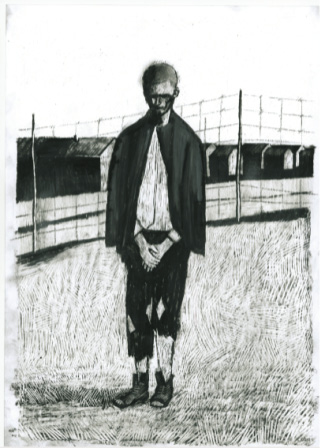
The shirt was made like the stole of a priest. After three days my trousers fell into pieces, they were made with a bigger thread than that of the "bales" (Author's note: This is how my grandfather used to call the burlap sacks he used for threshed grains.).
I seem to remember that they only left me my jacket. On the first day they gave us some polenta, then dried beets; in the morning they gave us tea. The ration of bread was a loaf in four pieces: the bread was black and made a shrieking sound under our teeth as we ate it. The loaf did not weigh even a kilo, we separated it into four pieces, we randomly decided who could choose the first quarter starting from the right or left. No one respected the rules, everyone wanted to get the biggest piece, we scuffled.
To avoid fistfights we made wooden scales. Of course, our hunger was intense. And the cold. In that area there isn't that much snow, but there are always storms accompanied by frost. The barrack held 250 soldiers, four barracks made up a group. When there was a storm, sleet passed through the cracks of the barracks and filled the room.
In the evening when we went to sleep, we all went to one side, slept directly on the floor without straw, with a battlefield blanket. After we had been lying down a while, it got to be so cold that the only way to get through it was to get up and start walking around the barracks.
One afternoon, to digest the ration of the day, I went to see a friend of mine who was in another group (Author's note: His name is Ugo Massaro, from Rovigo, who died of nephritis on December 27, 1917. Ugo is buried in the mass grave of the Sigmundsherberg lager's cemetery.).
I remember that, in addition to being made up of four quarters, each group was fenced with a 4-meter-high metal fence watched by a sentry with the pointing rifle that reminded you that you could not leave your group. I don't know what got into me that afternoon... but I was determined to go and see my friend.
I managed to make a hole in the net of our fence without being seen by the sentry and went to see my friend. When I went back, I had a bad surprise: the guard had realized that someone had passed through the hole and was staying close pacing four steps right and left. There was no way I would be able to return to my group.
At one point I summoned the courage and ran past. As soon as I went through, I threw myself among the friends of my barrack who were watching the scene nearby. Immediately the soldier put a bullet in the barrel and was about to shoot me. I saved myself because I was among my friends and the soldier was not able to identify me, or I don't know, maybe I was not meant to die.
After this experience I could not gather the courage to go and see my friend.
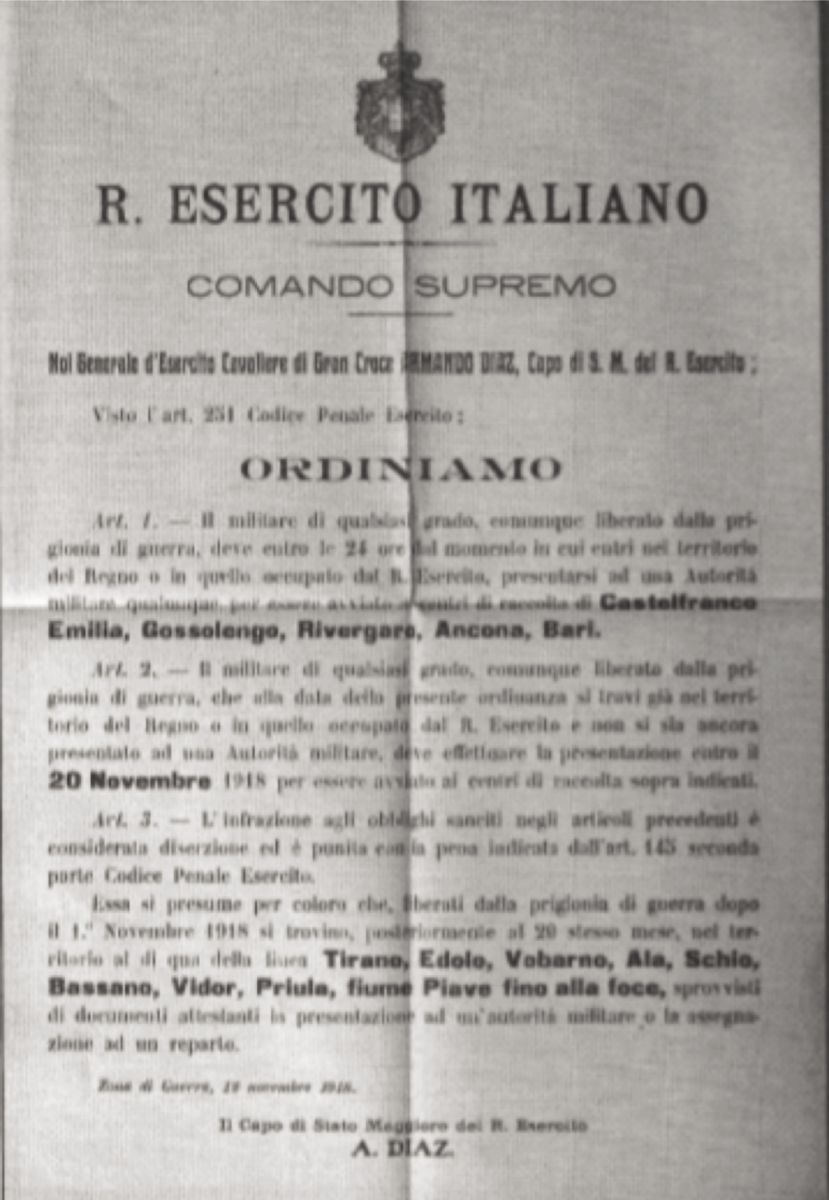
That same evening, I found in my group someone from my place called the "moro d'Giumbilon" who, just to make things worse, informed me that no less than thirty people died in that concentration camp every day. They took them away at three in the afternoon. One day I went with him to check: we saw thirty-three of our poor fellow countrymen being taken away. On average, one hundred soldiers died every three days. (Author's note: These soldiers were buried naked, in six overlapping rows, in the cemetery of the lager. Today all there remains is the cemetery, which Austria dedicated to my grandfather, Cermaria Elmo, on April 12, 2018.).
On January 13, 1918, we left to go to work in Transylvania. A thousand soldiers left the concentration camp (Sigmundsherberg), the whole group. It took 7 or 8 nights to travel there: Vienna, Budapest, Transylvania. Around June 8, 1918, they sent us to Croatia to Vinkovci. They were building a new railway that went to Zagreb and Rijeka. We got off the train. We were in the middle of mountains and we were led to an old house that was supposed to be our site. The Armistice was on November 4, 1918. The gendarmes told us: "Italians, you can go home." We did not believe it was true. Eight days before, on the evening of October 27th a hospital nurse told me: "Cermaria, we had a phone call saying the Armistice has been signed." Since nothing else was heard, we thought that it was again untrue. For this reason, we remained, five Italians, another four days waiting for the final news.
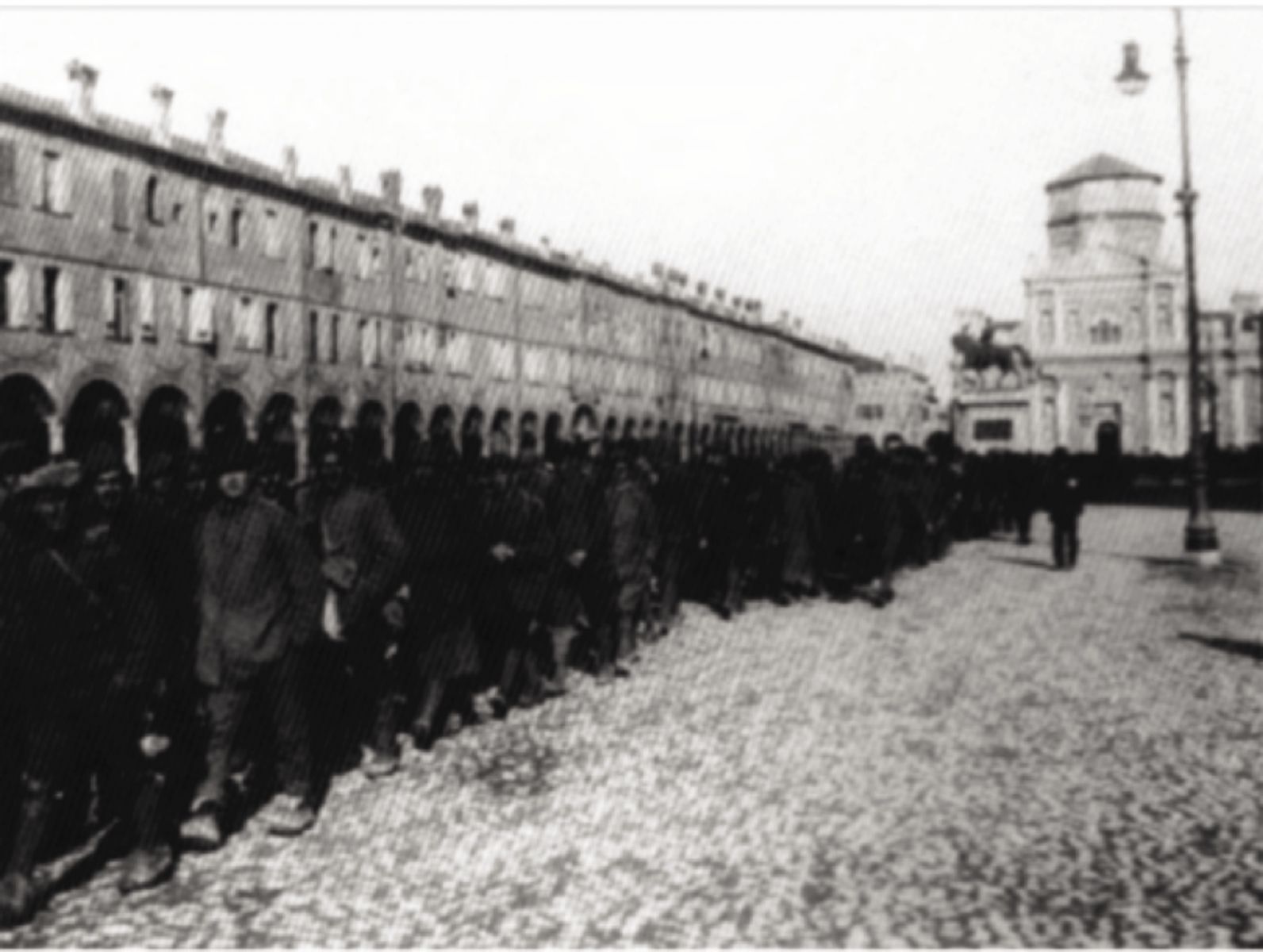 On November 8, 1918, we left and went to Fiume. We arrived in Fiume and still the Italians had not arrived, there were French and Italian ships in the port, but they had not come on land on the evening of November 11, 1918.
On November 8, 1918, we left and went to Fiume. We arrived in Fiume and still the Italians had not arrived, there were French and Italian ships in the port, but they had not come on land on the evening of November 11, 1918.
The carabinieri arrived on horseback and then the Bersaglieri and the infantry, without firing a shot, and then in the evening there was a large procession, and at city hall were placed the photographs of the King and Queen, and long live Italy.
(Author's note: My grandfather's story ends in Fiume.)

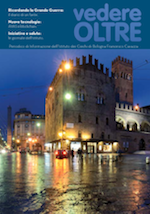



.png)